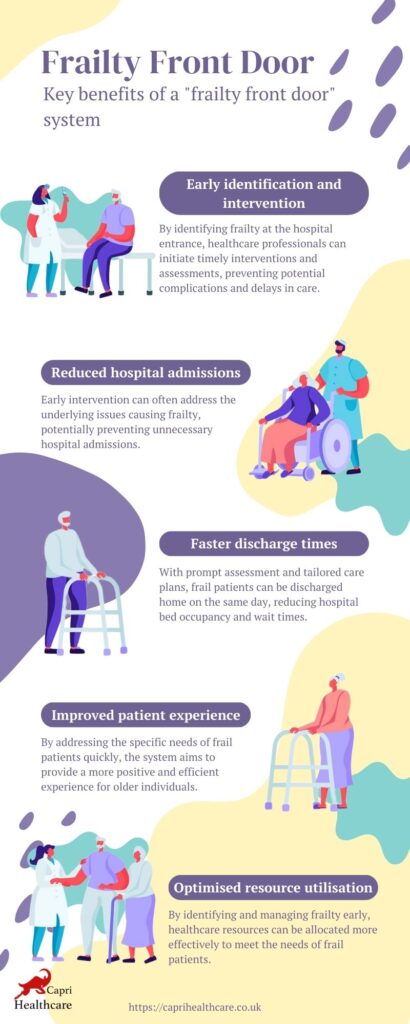Understanding Frailty and Its Growing Impact
Frailty is a medical condition that affects older adults, making them more vulnerable to illness, falls, and long recovery times. Poor Frailty management results in decreased strength, slower movement, and increased health risks. In the UK, frailty is becoming a pressing healthcare concern:
- 8.1% of adults aged 50+ in England were frail as of 2020. (PubMed)
- 1.8 million people aged 60+ in the UK live with frailty, rising from 6.5% at age 60–69 to 65% at age 90+. (Oxford Academic)
- 47% of hospital inpatients over 65 are frail, costing the NHS £5.8 billion annually. (NHS Confederation)
With the frail population projected to grow by 17% by 2035, proactive care is essential to improve outcomes and reduce financial strain.
The Financial and Operational Costs of Poor Frailty Management
Frailty management is not only a patient care issue but also a major financial challenge:
- Mild frailty triples primary care costs, while moderate and severe frailty increase costs four- and fivefold. (PMC)
- 67% of multi-morbid frail individuals will suffer from cognitive decline or dementia by 2035. (PMC)
To address these issues, healthcare Trusts must adopt a preventative, data-driven approach.
Aligning with National Frailty Strategies
The NHS FRAIL strategy promotes early frailty identification and same-day emergency care to reduce hospital admissions. (NHS England)
Similarly, the British Geriatrics Society advocates for ‘front door’ frailty services, which focus on early detection at hospital entry. (BGS)
A proactive approach can lead to faster interventions, shorter hospital stays, and better patient experiences. (iHub)

How TriVice Supports Trusts in Managing Frailty
TriVice is an advanced frailty management solution that helps healthcare Trusts reduce costs, optimise care, and improve outcomes.
1. Reducing Hospital Admissions with Early Identification
Frailty often remains undetected until a health crisis occurs. TriVice uses predictive analytics and real-time assessments to identify high-risk patients before complications arise.
- Risk Stratification: Identifies frailty earlier for better preventative care.
- Proactive Care Plans: Reduces emergency admissions by keeping patients healthier.
2. Shortening Hospital Stays with Tailored Care Plans
Frail patients stay longer in hospitals due to complications. TriVice enables fast-track discharge planning and coordination to ensure smoother transitions.
- Optimised Bed Utilisation: Reduces strain on hospitals.
- Seamless Care Coordination: Ensures safe transfers to home or community care.
3. Avoiding Costly Treatments with Preventative Interventions
Late-stage frailty leads to expensive acute interventions. TriVice empowers clinicians to implement low-cost, early interventions.
- Data-Driven Decision Making: Ensures timely and cost-effective treatments.
- Community-Based Support: Reduces reliance on hospitals for frail patients.
4. Enhancing Patient Well-Being Through Intelligent Monitoring
Frailty management is most effective with ongoing monitoring and early intervention. TriVice provides real-time tracking to detect deterioration before emergencies occur.
- Early Warning Alerts: Helps prevent critical health episodes.
- Improved Quality of Life: Encourages independence and active aging.
A Smarter, More Efficient Approach to Frailty Care
Frailty is a growing healthcare challenge, but proactive management can significantly reduce costs and improve outcomes. By integrating TriVice, healthcare Trusts can:
- Reduce hospital admissions and emergency visits
- Shorten hospital stays with personalised care plans
- Lower treatment costs by preventing severe complications
- Enhance patient independence and quality of life
Ready to Transform Frailty Management?
Discover how TriVice can help your Trust optimise frailty care, improve patient outcomes, and reduce costs. Contact us today to learn more!


